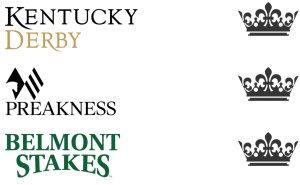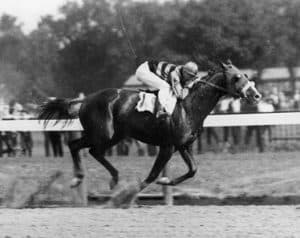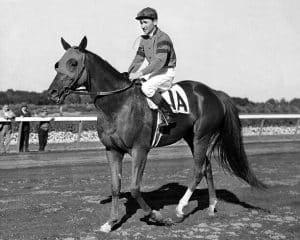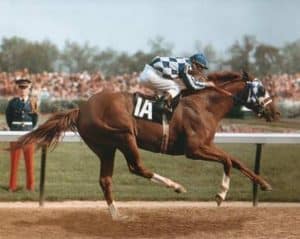Triple Crown Winners of Thoroughbred Racing
Triple Crown winners are among the most legendary Thoroughbred horses of all time. Achieving this rarest of feats involves winning a trio of the United States’ most prestigious horse races – the Kentucky Derby, Preakness Stakes, and Belmont Stakes.
Our Triple Crown winners guide covers everything you need to know about the most prestigious title in American horse racing.
What is the Triple Crown of Thoroughbred Racing?
The winner of America’s three most prestigious Grade I Thoroughbred races for three-year-olds claims the Triple Crown. As a concept, it borrows heavily from the English Triple Crown – a single-season triple header consisting of the 2000 Guineas, the Epsom Derby, and the St Leger.

Rules determine that the English Triple Crown, which was first won by West Australian in 1853, is only open to three-year-old Thoroughbred colts and fillies. Similarly, only three-year-old Thoroughbreds can contest the Kentucky Derby, Preakness Stakes, and Belmont Stakes.
The Triple Crown Trophy was commissioned in 1950 and has been awarded to all winners before and after. Online Kentucky Derby betting sites offer odds for all races – in many cases, you can also place special bets on a horse winning the Crown.
Charles Hatton who popularised the idea of the Triple Crown in 1930s America while writing for the Daily Racing Form, despite Sir Barton (1919) becoming the first horse to technically win it. However, it wasn’t until the 1940s that the term “Triple Crown” gained popularity in racing circles. Evidently, that would be one the most successful decade in Triple Crown history.
Which Races Have All the Triple Crown Winners Won?
All Triple Crown-winning horses have won these three events in the same season. It all starts with the horses on the Kentucky Derby schedule, as it’s the first race of the three.
- Kentucky Derby – The first jewel in the Triple Crown, the Kentucky Derby is held on the first Saturday in May at Churchill Downs in Louisville, Kentucky. Inaugurated in 1875, The Run for the Roses is one of the world’s most esteemed horse races.
- Preakness Stakes – Contested at Pimlico Race Course in Baltimore, Maryland on the third Saturday of May. The second of the three eligible races, the Preakness Stakes was first run in 1873.
- Belmont Stakes – The third and final leg of the Triple Crown, the Belmont Stakes is usually held on the second Saturday in June. Inaugurated in 1867, The Test of the Champion is the oldest and longest of these three US classic races.
List of Triple Crown Winners
There have been 13 Triple Crowns won since Sir Barton’s triumph in 1919. Despite the feat being a relative rarity, online Kentucky Derby sportsbooks offer odds for the Triple Crown, as well as for the individual races.
Here are all Triple Crown winners by year.
- Sir Barton (1919)
- Gallant Fox (1930)
- Omaha (1935)
- War Admiral (1937)
- Whirlaway (1941)
- Count Fleet (1943)
- Assault (1946)
- Citation (1948)
- Secretariat (1973)
- Seattle Slew (1977)
- Affirmed (1978)
- American Pharoah (2015)
- Justify (2018)
Early Past Triple Crown Winners
The first four winners of the Triple Crown series of horse races cemented their places in racing history during the interwar period. Sir Barton claimed his win in 1919, less than one year after the end of World War 1 in November 1918. It would take another 11 years to see anyone match his feat.
Sir Barton (1919)
As the first-ever winner of the Triple Crown, Sir Barton’s legendary status borders on the mystical. He was the brother of Belmont Stakes-winning Grey Lag and son of Irish-bred Star Shoot – one of America’s greatest sires of the 20th century.
A cranky horse with a disdain for humans, the soft-footed animal upset the apple cart at Louisville – before creating history at Belmont Park in 1919 for trainer H. Guy Bedwell and jockey Johnny Loftus.
Gallant Fox (1930)
Ranked #28 in the Top 100 U.S. Racehorses of the 20th Century by The Blood-Horse, Gallant Fox is still revered to this day. Foaled in 1927 and sired by Sir Galahad III, the 1930 winner of the Triple Crown series of races won 11 of his 17 events competed.
In addition to the Kentucky Derby, Preakness Stakes, and Belmont Stakes, the James E. Fitzsimmons-trained colt claimed other Grade I honors at the time. Guided by jockey Earl Sande, Gallant Fox assured a place in the pantheon of great American horses by securing glory at Belmont Park.
Omaha (1935)
In 1935, Omaha became the third winner of the ‘Crown. Unlike previous Kentucky Derby winners, the Belair Stud chestnut stallion could count championship pedigree in his blood. The son of 1930 winner Gallant Fox – also trained by Jim Fitzsimmons – could even claim the prestigious mare, Flambino, as part of his stock.
Canadian Horse Racing Hall of Fame jockey Willie Saunders rode Omaha to glory in three races to make the history books. However, the horse would also attract a rather unwanted record in becoming the only Triple Crown champion not to win Horse of the Year honors during their championship season.
War Admiral (1937)
Just two years after Omaha’s victory, the George Conway-trained War Admiral claimed the last Triple Crown of the interwar period. Jockey Charley Kurtsinger raced the esteemed horse, who was sired by the legendary Man o ‘ War – a horse widely considered to be the greatest American of the 20th Century.
War Admiral, who was foaled in May 1934, was somewhat smaller (15.2 hands) than his famous father (16.3), with more of a similar stature to his mother. Nonetheless, he demonstrated excellent speed and endurance to claim the last Triple Crown of the 1930s. A rival of the famous Seabiscuit, War Admiral went on to become the leading sire in North America in 1945.
Horse Racing Triple Crown Winners from the 1940s
The 1940s is still the most successful period for winners of the Triple Crown, with four emerging from the decade. Although a horse’s odds for the Kentucky Derby, Preakness Stakes, and Belmont Stakes would have been as high for the clean sweep.
Whirlaway (1941)
Jockey Eddie Arcaro stormed to victory in the 1941 Belmont Stakes to wrap up a convincing Triple Crown victory. Perhaps more impressive was that his horse, Whirlaway, would secure the Travers Stakes shortly after to become the only competitor to win all four races.
Whirlaway’s father, Blenheim, won England’s Epsom Derby in 1930. Owned by Calumet farm and trained by Ben A. Jones, the horse still holds the Kentucky Derby record for the longest winning margin with Assault (8 lengths). The United States Horse of the Year in 1941 & 1942, the horse holds one of the most illustrious records in American history.
Count Fleet (1943)
Son of Reigh Count, who won the 1928 Kentucky Derby and English Coronation Cup, Count Fleet was also from good horse stock. Foaled in 1940, he would go on to win the Kentucky Derby, Preakness Stakes, and Belmont Stakes under the jockey-trainer combination of Johnny Longden and Don Cameron.
Owned and bred by Fanny Hertz, Count Fleet earned wide acclaim by setting a then-record margin win of 25 lengths at Belmont Park to scoop the Triple Crown. A champion horse aged two, the bay-colored flyer earned a total of $250,300 in a career that lasted less than two seasons.
Assault (1946)
The only Texas-bred Triple Crown winner was sired by Bold Venture – a horse that won the Kentucky Derby and Preakness Stakes in 1936 before failing to enter Belmont Stakes due to lameness. Achieving more than his revered father, Assault gave jockey Warren Mehrtens and trainer Max Hirsch their first and only taste of Triple Crown Glory.
Assault’s mother was a full sister to the legendary Man o’ War. Despite being tormented by injuries to kidneys and knees, the “Club-footed Comet” went out as the penultimate winner of the Triple Crown in the decade. He earned a career total of $675,470 for King Ranch.
Citation (1948)
The first horse in history to earn $1 million in prize money, Citation was far from your average horse. Bred in Lexington, Kentucky by the Calumet Farm stable – who had won the first Triple Crown of the decade with Whirlaway – Citation was tipped for greatness. Understandable for a horse with royal stock including the likes of Musket, Bull Lea, and Bull Dog.
Eddie Arcaro, as he did with Whirlaway seven years prior, would claim glory at Belmont to secure the Triple Crown. In doing so, Arcaro became the first and only jockey to achieve such as feat. Calumet matched the Belair Stud’s record of two wins in the series, while Horace A. Jones secured his win as a trainer.
1970s Triple Crown Winners in Order
Americans had to wait until 1973 to see any further Triple Crown winners in horse racing. With no winners in the 1950s or 60s, there was great excitement when a horse by the name of Secretariat looked primed to make history.
Secretariat (1973)
No horse had previously set the fastest time records in the Kentucky Derby and Preakness Stakes heading to Belmont Park. When the starting gate opened to signal the start of the Belmont Stakes, all eyes were on the Meadow Stable-bred lightning bolt. Jockeyed by Ron Turcotte and trained by Lucien Laurin, “Big Red” was one of the hottest Triple Crown picks of the century.
What fans witnessed that afternoon in New York was an exercise in masterful racing. Not only did Secretariat win the Belmont Stakes to secure the first Triple Crown in 25 years – he also won by 31 lengths. This feat is considered by some racing historians to be the greatest accomplishment in a single season by a Thoroughbred horse.
Seattle Slew (1977)
Becoming a Triple Crown winner is no mean feat. But the great Seattle Slew also managed to triumph having remained undefeated in his previous races. A record that stood until 2018 when Justify swept the board to win at Belmont Park and extend the number of American Triple Crowns won.
Back in ’77, Seattle Slew was as fine a horse as anything that came before him. An odds-on favorite in each race he was entered into, bettors suffering from “Slewmania” could not get enough of him. No achievement does jockey Jean Cruguet, trainer William H. Turner Jr., and breeder Ben S. Castleman as must justice as 1977’s Crown victory.
Affirmed (1978)
With 22 years remaining of the millennium, few expected Affirmed to be the last Triple Crown winner of the 20th Century. The incredible chestnut stallion would leave fans waiting 37 years until American Pharoah’s famous win – however, the Harbor View Farm-bred zipper would give them something nice to remember.
Affirmed, who enjoyed an iconic rivalry with Alydar, would see his track nemesis into 2nd place in all Triple Crown races that year. Finishing with a record of 22-5-1 and career endings of $2,393,818 puts him as one of the true greats of Triple Crown racing. Steve Cauthen and Laz Barrera would become the last jockey-trainer duo to win until 2015.
2015 Grand Slam & Triple Crown Winners American Pharoah
Some 37 years passed before another horse not only achieved the Triple Crown, but took equine excellence on the track to even greater heights. American Pharoah landed the Rebel Stakes and Arkansas Derby en route to Churchill Downs where he justified his status as favorite and prevailed by a length.
He then made most of the running at Pimlico, following-up on Kentucky Derby glory with Preakness Stakes success. Trainer Bob Baffert had his first Triple Crown in the bag with a wire-to-wire display of dominance from American Pharoah in the Belmont.
That would be enough for most horses, but not this one. American Pharoah coasted home in the Haskell Invitational around Monmouth Park. Although beaten in the Travers Stakes, he put his Midsummer Derby disappointment behind him when achieving the Grand Slam of adding the Breeders’ Cup Classic to his resume on top of the Triple Crown.
Recent Triple Crown Winners – Justify in 2018
Baffert struck Triple Crown gold again just three years after American Pharoah with Justify. Unraced at two, he progressed quickly capturing the Santa Anita Derby on just his third career start. Justify then left California for his first-ever appearance on the track outside the Golden State in the Kentucky Derby where he led half-a-mile from the wire.
Dropping back in distance for the Preakness may not have been ideal, but he still held on and then became the last Triple Crown winners horses to date. Justify made all the running, yet again as a hot favorite, in the Belmont Stakes over further which he relished with an unchallenged success. What a pity that injury meant this was the last time he raced.
Table of Triple Crown Winners in Order By Year
While it may not directly aid a robust Kentucky Derby betting strategy, it’s not a bad idea to learn more about the history behind the series. This table outlines winners, jockeys, trainers, and more.
Horse Year of Win Jockey Trainer Owner Breeder Sir Barton 1919 Johnny Loftus H. Guy Bedwell J. K. L. Ross John E. Madden Gallant Fox 1930 Earl Sande Jim Fitzsimmons Belair Stud Belair Stud Omaha 1935 Willie Saunders Jim Fitzsimmons Belair Stud Belair Stud War Admiral 1937 Charles Kurtsinger George Conway Samuel D. Riddle Samuel D. Riddle Whirlaway 1941 Eddie Arcaro Ben A. Jones Calumet Farm Calumet Farm Count Fleet 1943 Johnny Longden Don Cameron Fannie Hertz Fannie Hertz Assault 1946 Warren Mehrtens Max Hirsch King Ranch King Ranch Citation 1948 Eddie Arcaro Horace A. “Jimmy” Jones Calumet Farm Calumet Farm Secretariat 1973 Ron Turcotte Lucien Laurin Meadow Stable Meadow Stable Seattle Slew 1977 Jean Cruguet William H. Turner Jr. Mickey and Karen L. Taylor, Tayhill Stable/Jim Hill, et al. Ben S. Castleman Affirmed 1978 Steve Cauthen Laz Barrera Harbor View Farm Harbor View Farm American Pharoah 2015 Victor Espinoza Bob Baffert Ahmed Zayat Ahmed Zayat Justify 2018 Mike Smith Bob Baffert China Horse Club, Head of Plains Partners, Starlight Racing, WinStar Farm John D. Gunther Failed Bids to Win the Triple Crown
Thoroughbred horse Triple Crown winners are immortalized in history on account of their triumphs in the three major races on the American racing calendar. There have been near misses, however – in other words, horses that won two of the three races. Ultimately, 1st place results for the Kentucky Derby and Preakness Stakes are not enough to win you the Triple Crown.
Year Horse Name Finishing Position in Belmont Stakes 1932 Burgoo King Non-entry (lameness). 1936 Bold Venture Non-entry (lameness). 1944 Pensive 2nd. 1958 Tim Tam 2nd. 1961 Carry Back 7th. 1964 Northern Dancer 2nd. 1966 Kauai King 2nd. 1968 Forward Pass 2nd. 1969 Majestic Prince 2nd. 1971 Cañonero II 4th. 1979 Spectacular Bid 3rd. 1981 Pleasant Colony 3rd. 1987 Alysheba 4th. 1989 Sunday Silence 2nd. 1997 Silver Charm 2nd. 1998 Real Quiet 2nd. 1999 Charismatic 3rd. 2002 War Emblem 8th. 2003 Funny Cide 3rd. 2004 Smarty Jones 2nd. 2008 Big Brown Last. 2012 I’ll Have Another Scratched. 2014 California Chrome 4th. FAQs
How many Triple Crown winners have there been in total?
At the time of writing, there are 13 Triple Crown winners in total. You can find results, names, dates, and more information by reading through our Triple Crown winners list above.
Do any Triple Crown winners jockeys have multiple wins?
Eddie Arcaro is the only jockey to have recorded multiple wins, with two. Arcaro rode Whirlaway in 1941 and Citation in 1948 for two-time Triple Crown winners racing owners, Calumet Farm.
How many Triple Crown winners are there in modern times?
If we class the modern era as the 21st Century, then there have been two winners of the Triple Crown series of races since 2000. These are American Pharoah in 2015 and Justify in 2018.
Who is the greatest Triple Crown winner ever?
Secretariat, who accomplished a Triple Crown win in 1973, is regarded as the greatest by most racing historians and fans. Secretariat holds the stakes record for all three races in the series, having clocked in at 1:59 (Kentucky Derby), 1:53 (Preakness Stakes), and 2:24 in the Belmont Stakes. This is, by far, the greatest run in Triple Crown history.
Our racebook reviewer Adam Haynes knows what best in class looks like and gives a balanced view of all those betting sites that appear here. If you want to know the pros and cons of wagering with a firm, he knows them from every angle.
Best Kentucky Derby Betting Sites
9.701/03/249.601/03/249.601/03/249.601/03/249.608/03/249.604/03/24



